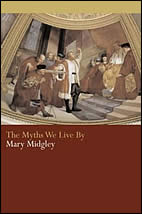 Formas de pensar. Símbolos. Mitos. Aproximaciones al mundo que no discutimos porque nos parecen evidentes. Metáforas. En cuanto uno reflexiona, son fáciles de identificar, pero en ocasiones su influjo es tan poderoso que no sólo no podemos evitar emplearla, sino que condicionan nuestra actuación en el mundo.
Formas de pensar. Símbolos. Mitos. Aproximaciones al mundo que no discutimos porque nos parecen evidentes. Metáforas. En cuanto uno reflexiona, son fáciles de identificar, pero en ocasiones su influjo es tan poderoso que no sólo no podemos evitar emplearla, sino que condicionan nuestra actuación en el mundo.
Genetic engineering. Building blocks of life. Selfish genes.
These phrases, after all, are all imaginative metaphors. We are encouraged to think that the language of science opposes myth, but does it? Mary Midgley argues in her powerful new book that far from being the opposite of science, myth is a central part of it.
In her customary brilliant prose, she argues that myths are neither lies nor mere stories but a network of powerful symbols that suggest particular ways of interpreting the world. In The Myths We Live By she spells out how we go wrong about several of the most powerful, such as the myth of the Social Contract and points out how profoundly some of our strongest myths today are shaped by our favourite technologies, notably the microscope and the computer. There is also the myth of progress -now disguised as evolution- the myth of a body quite separate from the mind, and the myth of omnicompetent science.
Drawing shrewdly on a wealth of examples such as the unhelpfulness of memes -the alleged genes of culture- as explanations of social change and the way in which current hopes for biotechnology are repeating the errors of the alchemists, she spells out what goes wrong when we try to apply the atomistic metaphors of science to the large-scale problems of our lives. She does not, however, blame science itself for this. Instead, she deftly shows how its name is unfairly blackened when we pressgang it into the wrong places.
A tour de force of clear thinking on why we are more that the sum of our molecules, The Myths We Live By is essential reading for anyone concerned about how we should understand the world today.
[Estoy escuchando: «Walkin'» de The Night of the Cookers en el disco Live at Club La Marchal]
—–
